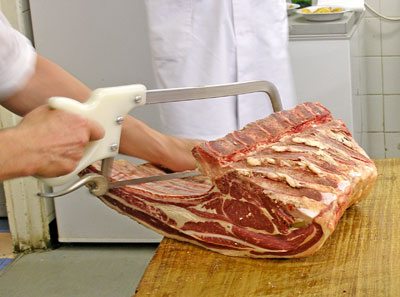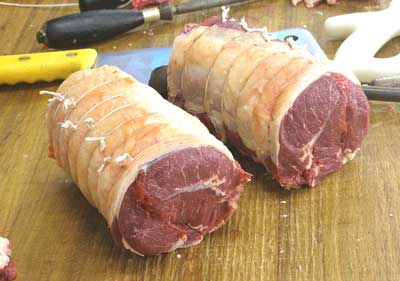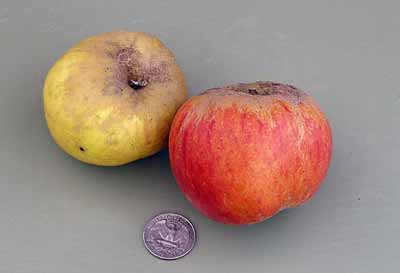
Beef cut. Fore rib or best rib from next to the sirloin can be sold on the bone or boned and rolled for roasting. It is lean and tender. Middle rib, made up from the top and back ribs, comes between the fore rib and the blade bone. It is a large joint which is often boned and rolled. They are lean joints, with less bone than the fore rib. The wing or prime rib is the largest, most expensive and certainly one of the best roasting joints. It should have a large central eye or meat and a good outer layer of creamy white fat. It is good to roast. If boned, it is best to braise or pot roast it.
A rounded, fluted loaf tin. The loaf produced in it is called a Balmoral loaf. The flutings are the size of slices.
A semisoft, crumbly cheese from the Dales with a creamy flavour. It can be obtained smoked or flavoured with garlic. Versions are also made with buffalo and goat's milk. This was a Bronze Medal Winner at 1996 British Cheese Awards.
A small sheep's milk cheese covered with red wax. Versions are also available in goat, cow and buffalo milk.
A very mild goat's milk cheese with a texture similar to a young Caerphilly. Versions are also made with buffalo and cow's milk.

Blade meat. A sub-primal cut of the beef primal rib. It is the lean flesh overlying the rib eye and ribs.
Beef cut. Large steaks, usually one rib bone thick, with quite a lot of marbling. The Delmonico or Spencer steak is the eye of the rib, with the bone, fat and coarser meat removed. Use as fillet or tenderloin.

A medium-sized dessert apple, green to golden-yellow with crimson red cheeks. One of the great apples, it as crisp flesh with great depth of flavour and aroma. It is thought to have been raised in 1707 by Sir Henry Goodricke of Ribston Hall near Knaresborough in Yorkshire from a seed brought from Rouen in 1688, although I have also seen this arrival from France dated at 1769. It received the Royal Horticultural Society Award of Merit in 1962 and the Award of Garden Merit in 1993. This late-season variety is harvested from late September in South-East England and is at is best from October to January. It is a parent of Cox's Orange Pippin.